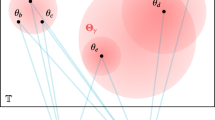Abstract
There is a need to bring about a revolution in the philosophy of science, interpreted to be both the academic discipline, and the official view of the aims and methods of science upheld by the scientific community. At present both are dominated by the view that in science theories are chosen on the basis of empirical considerations alone, nothing being permanently accepted as a part of scientific knowledge independently of evidence. Biasing choice of theory in the direction of simplicity, unity or explanatory power does not permanently commit science to the thesis that nature is simple or unified. This current ‘paradigm’ is, I argue, untenable. We need a new paradigm, which acknowledges that science makes a hierarchy of metaphysical assumptions concerning the comprehensibility and knowability of the universe, theories being chosen partly on the basis of compatibility with these assumptions. Eleven arguments are given for favouring this new ‘paradigm’ over the current one.
Similar content being viewed by others
REFERENCES
Atkins, P. W.: 1983, Molecular Quantum Mechanics, Oxford University Press, Oxford.
Einstein, A.: 1949, ‘Autobiographical Notes’, in P. A. Schilpp (ed.), Albert Einstein: Philosopher-Scientist, Open Court, La Salle, Illinois, pp. 1–94.
Goodman, N.: 1954, Fact, Fiction and Forecast, Athlone Press, London.
Kuhn, T. S.: 1970, The Structure of Scientific Revolutions, Chicago University Press, Chicago.
Lakatos, I.: 1970, ‘Falsification and the Methodology of Scientific Research Programmes’, in I. Lakatos and A. Musgrave (eds), Criticism and the Growth of Knowledge, Cambridge University Press, Cambridge, pp. 91–196.
Maxwell, N.: 1968, ‘Can there be Necessary Connections between Successive Events?’, British Journal for the Philosophy of Science 19, 1–25.
Maxwell, N.: 1972, ‘A Critique of Popper's Views on Scientific Method’, Philosophy of Science 39, 131–152.
Maxwell, N.: 1974, ‘The Rationality of Scientific Discovery, Parts I and II’, Philosophy of Science 41, 123–153 and 247–295.
Maxwell, N.: 1984, From Knowledge to Wisdom: A Revolution in the Aims and Methods of Science, Basil Blackwell, Oxford.
Maxwell, N.: 1992, ‘What Kind of Inquiry Can Best Help Us Create a Good World?’, Science, Technology and Human Values 17, 205–227.
Maxwell, N.: 1993, ‘Induction and Scientific Realism: Einstein versus van Fraassen: Parts I, II and III’, British Journal for the Philosophy of Science 44, 61–79, 81–101 and 275–305.
Maxwell, N.: 1998, The Comprehensibility of the Universe, Oxford University Press, Oxford.
Maxwell, N.: 2000, 'Can Humanity Learn to become Civilized? The Crisis of Science without Civilization, Journal of Applied Philosophy 17, 29–44.
Maxwell, N.: 2001, The Human World in the Physical Universe: Consciousness, Free Will and Evolution, Rowan and Littlefield, Lanham, Maryland.
Maxwell, N.: 2002, ‘Is Science Neurotic’, Metaphilosophy 33.
Miller, D.: 1974, ‘Popper's Qualitative Theory of Verisimilitude’, British Journal for the Philosophy of Science 25, 166–177.
Poincaré, H.: 1952, Science and Hypothesis, Dover, New York.
Popper, K. R.: 1959, The Logic of Scientific Discovery, Hutchinson, London.
Popper, K. R.: 1963, Conjectures and Refutations, Routledge and Kegan Paul, London.
Reichenbach, H.: 1938, Experience and Prediction, Chicago University Press, Chicago.
Salmon, W.: 1989, Four Decades of Scientific Explanation, University of Minnesota Press, Minneapolis.
Smart, J. J. C.: 1963, Philosophy and Scientific Realism, Routledge and Kegan Paul, London.
Sokal A. and Bricmont, J.: 1998, Intellectual Impostures, Profile Books, London.
Tichý, P.: 1974, ‘On Popper's Definition of Verisimilitude’, British Journal for the Philosophy of Science 25, 155–160. 13 Tavistock Terrace London N19 4BZ GB-England (nicholas.maxwell@ncl.ac.uk)
Author information
Authors and Affiliations
Corresponding author
Rights and permissions
About this article
Cite this article
Maxwell, N. The Need for a Revolution in the Philosophy of Science. Journal for General Philosophy of Science 33, 381–408 (2002). https://doi.org/10.1023/A:1022480009733
Published:
Issue Date:
DOI: https://doi.org/10.1023/A:1022480009733



